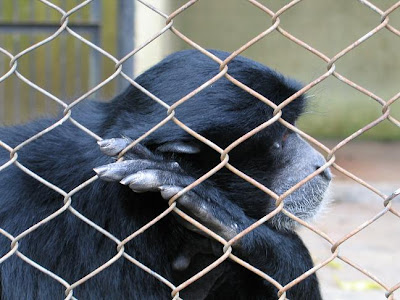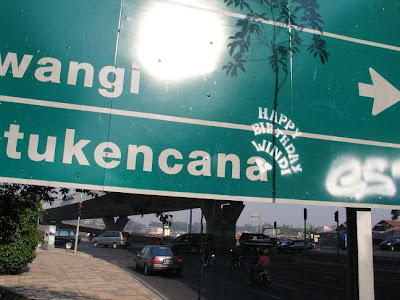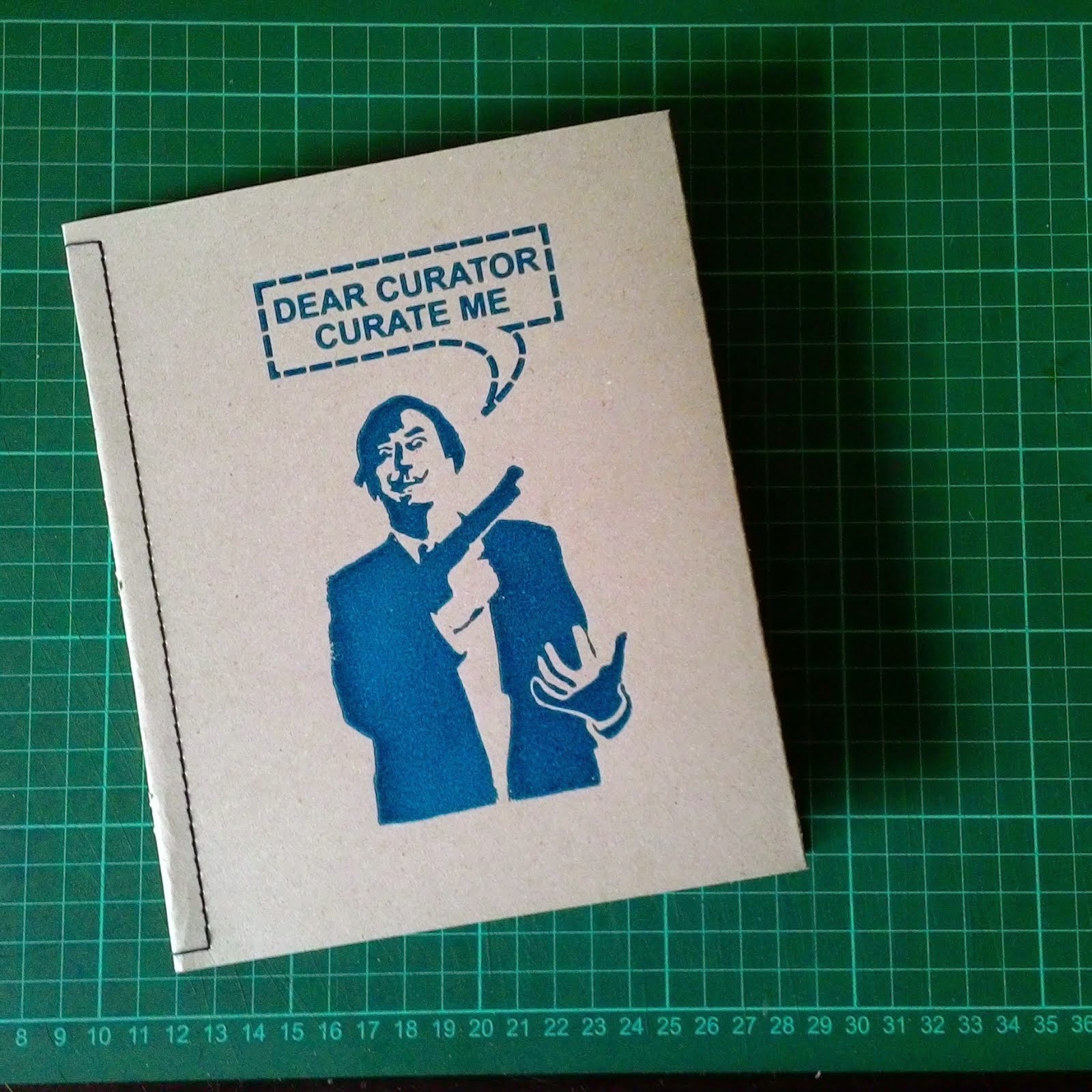
Monday, May 28, 2007
Friday, May 25, 2007
Delusion
Monday, May 21, 2007
Underpass
Friday, May 18, 2007
Thursday, May 17, 2007
Who/What is a Dog?

The first time I saw this – dilarang buang sampah di sini kecuali anjing – I thought that this was its meaning: ‘It is forbidden to dump garbage here with the exception of dogs.’ So I thought it was allowed to leave dogs behind in front of this house (perhaps because the owner of this house loves to eat dogs), I didn’t read it as if dogs were allowed to take a dump here. But I should have read the word anjing – i.e. dog – in a non-literal way, thus: you are an asshole if you dump garbage at this spot.
Wednesday, May 16, 2007
(Re)View

This is my view. Taman Anggrek mall in West Jakarta is the view from my study. Not only I should not have this view, because both the mall and the apartment building where I live are constructed in violation of the spatial plan (this area was supposed to be a water catching reservoir, the nearby kampungs paid a dire price during the recent heavy rains). But also because soon new high-rise apartments will block my view.
Tuesday, May 15, 2007
Work with dirty hands
Job with five legs

South-east Asian countries suffered a major economic influenza in 1997. For a country like Singapore it was merely a hiccup, Indonesia, though, is still recovering from that flu. Many Indonesians had to deal directly with the consequences of the economic crisis. Many lost their job. Many turned to the informal sector (informal should not be read as illegal). I heard that there are now much more kaki-lima’s than a decade earlier. Kaki-lima literally means five feet; it is a push cart which is used to prepare a meal right in front of your door. And in Indonesia food has sound, a kaki-lima that has sate for sale is announced in a different way than, for example, nasi goreng. So from far one can hear one’s favorite dish being on its way. From the kaki-lima in the picture above one can buy mie baso (i.e. a noodle soup with small meatballs), which is very delicious. Once I met a kaki-lima man who worked a decade ago as a cook in a posh restaurant.
Thursday, May 10, 2007
Competition for Space

The Transjakarta Busway started operating between Stasiun Kota and Blok M in 2004 (the red line on the map), and only few years later the network has been expanded to cover large parts of Jakarta. And its network is still expanding. It is a cheap and fast way to do something about traffic congestion (a monorail, for example, requires more time, money and expertise to be constructed). The Transjakarta busses bypass traffic jams, because they use special assigned lanes. The Busway system seems to be a success, the busses are always full. But the question remains whether car owners are willing to use this cheap alternative (tickets are only 3500 Rupiah, no matter how far you want to go, that is 1500 Rupiah cheaper than other AC-equipped busses), the users seem to be lower and lower-middle class (but perhaps people are now willing to postpone or even annul the purchase of an automobile). The Transjakarta Busway found its inspiration in another mega third world city: Bogota, the capital of Columbia, which is called TransMilenio (see here). The TransJakarta Busway meets mockery, just because it's felt by the well-to-do that it eats up their space. The well-to-do and the poor are in a fierce competition for space in the city of Jakarta.
Wednesday, May 9, 2007
Aliens at home

Always being seen and treated as a strange outsider is rather alienating, but there is a comfort: Indonesian poet and essayist Goenawan Mohamad writes that in Jakarta everyone is a foreigner, in Jakarta everyone’s place of origin is somewhere else. Jakarta is a city of strangers and therefore a city without citizens. For the ancient Greeks a stranger is equated with a barbarian. Is a civilized civil society possible in a city like Jakarta where no one feels at home, where no feels secure, and where everyone dreams of some place else (e.g. a heavenly home)? The photo is taken nearby the Dutch embassy. And the text says: “Where do you want to go to? Straight home…” But where is that?
Monday, May 7, 2007
Elevated Highways

If the urban poor can be pictured as lacking rationality and morality it becomes justified to create efficient ways to bypass them. The flyovers are a good symbol – literally flying over the kampungs – to show the upward mobility of some to escape the frightening urban poor. (For an interesting essay on corporate cities built by Lippo in Jakarta see here.)
Thursday, May 3, 2007
Wednesday, May 2, 2007
Memory

Going through my pictures I came across a photograph I cannot recall to have taken. The photographer Gary Winogrand said that one should leave photos alone until all emotional attachments have withered to really be able to judge the quality of the images. (For photographs by and information on Winogrand see here.)
Tuesday, May 1, 2007
Encounters

The Faculty of Philosophy, where I teach in Bandung, is surrounded by local powers. It is surrounded by divine forces: the Catholic St.Angela Church, which was recently renovated; a mesjid (i.e. mosque), I forgot its name, for Friday afternoon prayers it is too small so at Fridays it occupies the street as well and often the early morning solat wakes me up; and the office of the Salvation Army. And it is surrounded by armed forces: the military police; the secret police, where I have to go and report myself every time I renew my visa to undergo a security check (red tape that leads to informal taxation); and the traffic police, from time to time wrecked cars are parked in front (which leads to more informal taxation, at least if the driver wants his car returned, and tires are flattened to avoid the car to be taken before payment is made).
Subscribe to:
Posts (Atom)


















